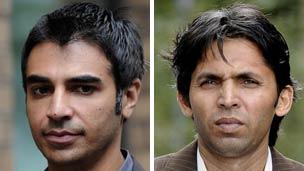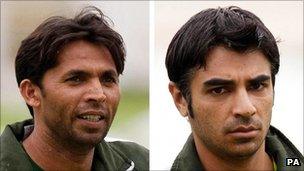Pakistan cricketers' trial shows 'rampant corruption'
- Published

Salman Butt and Mohammad Asif deny taking bribes to bowl deliberate no balls
The trial of two Pakistan cricketers accused of being involved in a betting scam shows the "rampant corruption at the heart of international cricket".
Prosecutor Aftab Jafferjee QC made the comments as the trial of former captain Salman Butt, 26, and fast bowler Mohammad Asif, 28, began in London.
The pair deny charges of conspiracy to cheat and conspiracy to accept corrupt payments over a Test match at Lord's.
A tabloid newspaper alleged they took bribes to bowl deliberate no balls.
Speaking at Southwark Crown Court, Mr Jafferjee said the players, along with fast bowler Mohammad Amir, 19, conspired with UK-based sports agent Mazhar Majeed, 36, to fix parts of the Lord's Test during last year's tour of England.
He said the four men were motivated by greed to "contaminate" a match watched by millions of people and "betray" their team, the Pakistan Cricket Board and the sport itself.
He added that there were "simply breathtaking" sums of money involved in foreign betting markets.
"This case reveals a depressing tale of rampant corruption at the heart of international cricket, with the key players being members of the Pakistan cricket team," he said.
"Those involved in this plot - which is effectively what a conspiracy is - lent themselves willingly, and for financial gain, to fix not just the outcome of the match but in particular, aspects within each match on a day-by-day basis."
'Fixing' games
The allegations stem from an investigation by Mazher Mahmood, former undercover reporter for the now-defunct News of the World.
The undercover reporter learned of allegations that Mr Majeed was involved in fixing matches and realised, if true, it was a matter of "such enormous consequence" to cricket that it demanded investigation and exposure, the court heard.
Pretending to be a wealthy Indian businessman called Mohsin Khan, Mr Mahmood met Mr Majeed to discuss the possibility of staging a tournament to be held in the United Arab Emirates.
At the end of the meeting, he broached the subject of fixing games, saying that at least three players would be needed to be involved in the scam, the jury was told.
Mr Majeed allegedly replied: "Boss, I've got six already."
At a separate meeting, the undercover journalist agreed to pay £10,000 in return for a no-ball to be played as a "tester" of Mr Majeed's ability to fix matches, the court heard.
'Willing participants'
The case centres on the Test match between Pakistan and England at Lord's Cricket Ground in London from August 26 to 29 last year.
The four men are accused of "spot fixing", where parts of a match are illegally rigged, for example by timing the delivery of a deliberate wide or no-ball, but the overall outcome of the game is not manipulated.
The court heard that gamblers in the Indian sub-continent bet on everything from the outcome of matches to individual events, such as how many no-balls or wides will be bowled in an over or an innings.

The prosecution says the alleged match fixing occurred during a Test match at Lord's
The jury was told that the constantly changing odds are calculated by "influential but shadowy" figures based in London, Karachi in Pakistan, Mumbai in India and Dubai in the UAE.
Mr Jafferjee said as much as $200m US dollars (£130m) could be bet on a Twenty20 match in Mumbai alone.
"Inside information is thus a hugely valuable commodity, which can only come into existence once players are prepared to participate in the way that they must," he said.
Mr Jafferjee added that Mr Butt and Mr Majeed were "central" to the conspiracy but could not have carried out their corrupt practices without the participation of Mr Asif and Mr Amir, Pakistan's leading fast bowlers.
"It is the prosecution's case that all four men were involved," he said.
"And by the time the last Test match at Lord's took place, each of them was well at it, the two bowlers being orchestrated by their captain and the captain's agent, Majeed, to bowl three no-balls at a pre-arranged point in the game...
"The bowlers were willing participants so that they could all profit, those lower down the ladder probably profiting less than those at the top."
Mr Jafferjee read to the court an "ironic" section of Mr Butt's contract with the Pakistan Cricket Board which says players must immediately notify their manager and captain if they are approached by anyone who asks them to fix a match.
"It is difficult to report it to the captain if the captain is well at it," he said.
The jury was told that only Mr Butt and Mr Asif were on trial, but Mr Jafferjee said there was "nothing sinister" in the absence of Mr Majeed and Mr Amir from the proceedings.
The trial continues.